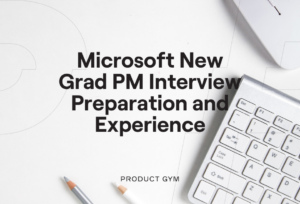Product management is a juggling act. It involves rallying a team together, pleasing executives, being a customer advocate, and much more—all of which depend on you to facilitate efficient workflow and keep the wheels rolling in the right direction. Interviewers want to know you’re up to the task and will be looking for proof of it in the way you answer their questions and the responses you give. Product Manager buzzwords that speak to your ability to accomplish everything described above and more can take your interview to the next level.
One of the markers of an experienced and competent PM is their familiarity and use of product vocabulary. But it’s not just any industry buzzwords. We did a survey across the country and found that people hiring for Product Manager roles want to hear more about certain keywords to determine whether or not a candidate is a right fit for them.
The Product Manager buzzwords we discovered are:
- Stakeholder consensus
- Customer empathy
- Cross-functional teams
- Requirements and documents
- Agile and/or Scrum Ritual
- KPIs
Does that mean adding any of these six buzzwords to your interview responses can make the difference between whether or not you move forward in the interview process?
Yes, it does. Here’s what each Product Manager buzzword means and why you should be incorporating them into your interview.
Stakeholder Consensus
You need to develop an idea, solve a problem, or simply get everyone on the same page about your product roadmap. Whatever the situation, you’ll require harmony amongst everyone involved or impacted by the decisions made.
This is why stakeholder consensus is crucial. Multiple parties come with their own opinions, agendas, and even egos—you won’t be able to make progress on a project if they are not in alignment.
While total consensus may not be possible, the PM still faces the task of presenting ideas and communicating the product roadmap effectively enough to achieve some sort of buy-in from all participants.
It’s easy to see why the ability to achieve stakeholder consensus is a top skill interviewers look for. Do you know how to prioritize stakeholder needs? Can you take in their requests and communicate them to the other parties involved? And a very relevant one for any manager: How do you manage difficult stakeholders?
Using this Product Manager buzzword allows you to demonstrate everything from your organization and communication skills to effective people management.
Customer Empathy
Delivering products that captivate customers starts with getting to the heart of what they really want. This process involves putting yourself in the customer’s shoes so that you can fulfill their needs.
Customer empathy is absolutely critical to the Product Manager’s job. Without it, employees focus on their own problems and build solutions for them, rather than the customers’. They end up with a product that is awesome to them and to other Product Managers, but a flop in the market.
Not only does empathy increase customer satisfaction and loyalty, it’s an integral part of innovation. One interesting example of empathy for innovation is how Airbnb, one of the world’s biggest online marketplaces for vacation rentals, came up with Neighborhood Guides—their second most popular product.
Their co-founder and CEO Nathan Blecharczyk detailed the process:
We then had a roadmap for figuring out what a customer expects in each of those (online booking) situations, what we were doing to meet those expectations, and where we had an opportunity to create a “wow” moment. We noticed a lot of gaps. It became our number one priority to fix those areas where we weren’t doing what the customer expected of us.
So you see why your interviewer will be looking for evidence of customer empathy in your product management process. They want to see if you can garner insights on problems to solve and identify the right audience to solve for. Even proven approaches do not make up for a lack of empathy in product design.
Cross-Functional Teams
Cross-functional product teams are all the people involved in the creation of a product—each with different functional expertise. A typical team consists of:
- The Product Owner or Product Manager
- Business Analysts
- Engineers
- Data scientists
- UI/UX designers
By definition, these parties also fall under stakeholders. But cross-functional teams differ from stakeholder consensus in that they comprise the parties directly involved in the product-making process. These parties may be from different functional areas, but they are all interdependent and require a great deal of interpersonal collaboration to reach a common goal.
Why Is This Product Manager Buzzword Important to Your Interviewer?
Teamwork is a term that is focused on in plenty of organizations, but calling a group of people a team does not necessarily mean they are working as one. A key responsibility of the Product Manager is to create a working structure that relies heavily on collaboration while still being agile and efficient.
Win over your interview by incorporating the Product Manager buzzword:
- Express your ability to manage the expectations in a setting where people have different roles and expertise, varied capacities, and work at different speeds.
- Give some examples of your problem-solving skills.
- Describe the processes you use to keep everything and everyone in check—whether that be conducting regular quality-assurance checks or creating delivery milestones.
- Share how you provide both positive and negative feedback.
- Detail what you do or have done in the past to get the most out of your team and empower them to make decisions.
Tailor your answer to the above points and you will position yourself as an ideal candidate for both small and large cross-functional teams.
Requirements and Documentation
As with any process, product design and creation involves a lot of paperwork. From key items such as marketing requirements documents (MRDs) and product requirement documents (PRDs) to feedback notes: Gathering requirements and documenting them is a critical skill that interviewers are looking for.
Not only does it help teams make better-informed decisions, it also enables more accurate allocations for timelines, resources, and budgets. However, these tasks tend to be overlooked because of their tedious nature, resulting in piles and piles of inefficiency-causing backlogs.
Worst case scenario, lack of proper documentation could lead to design or development mistakes. No one wants this to happen to their process, thus candidates who prioritize requirements and documentation are highly coveted by product teams. Touching on this among your Product Manager buzzwords is a way of impressing your interviewer.
Agile and/or Scrum Ritual
Product design does not go from start to finish in one fell swoop. As much as any Product Manager would love it to be otherwise, the process has to be broken down into phases—sometimes there is back-tracking, and many times the process is delayed in one phase or another.
As such, any Product Manager should be familiar with Agile Methodology: Frameworks used by teams to promote continuous iteration of development and testing. One of the most popular, if not the most popular frameworks, is Scrum: A framework mainly used to remove obstacles to getting work done. Teams complete work in short cycles called sprints and meet daily to discuss current tasks and roadblocks to progress.
These processes are one of the most essential principles in product management, and mastery of one or more of them is something that the interviewer will be looking for.
How do you help your teams work efficiently and effectively to achieve the highest quality product? Take your interviewer through the frameworks you have used in the past, highlighting successes and how you overcame challenges along the way.
KPIs
Love them or hate them, key performance indicators (KPIs) measure progress as a Product Manager and they aren’t going anywhere. And yes, you are responsible for tracking and reporting on them.
But way before tracking and reporting comes the responsibility to determine the management metrics to use. Your interviewer is probably hiring you to join a new team and manage a new or existing project, they want to know that you will be able to keep track of already existing metrics or set new ones that ensure an agile and effective team.
Your new employer will want to hire someone who can get them to the finish line, so talk about how you have set KPIs and met them in the past. No project ever goes as planned, so make sure to highlight any roadblocks you may have faced and how you overcame them.
Work With an Interview Coach to Hone Your Interview Responses
If you’re struggling to convert Product Manager interviews into job offers, interview coaches like the ones at Product Gym can help you develop a strategic approach to incorporating the right Product Manager buzzwords and acing every round.
Our interview coaches provide a range of services to help you navigate the gruelling Product Manager interview process as an aspiring or first-time Product Manager. Some of these services are tangible and easy to unpack, like reviewing your case study presentations before you submit them, helping you formulate the best answers to prep for tricky first and second-round interview questions, and providing strategic advice on salary negotiation.
But product management interview coaches can also help you in more hard-to-describe ways. For example, Product Gym interview coaches might help you recognize red flags in the interview and navigate which companies you do and don’t want to pursue based on culture fit. They can also help you build your confidence, crush imposter syndrome, and develop a growth mindset. Our goal is to help our members land a Product Manager job they love, and succeed in their day-to-day as a PM. All in all, an interview coach will help ensure you make the absolute best impression possible on your interviewer.



